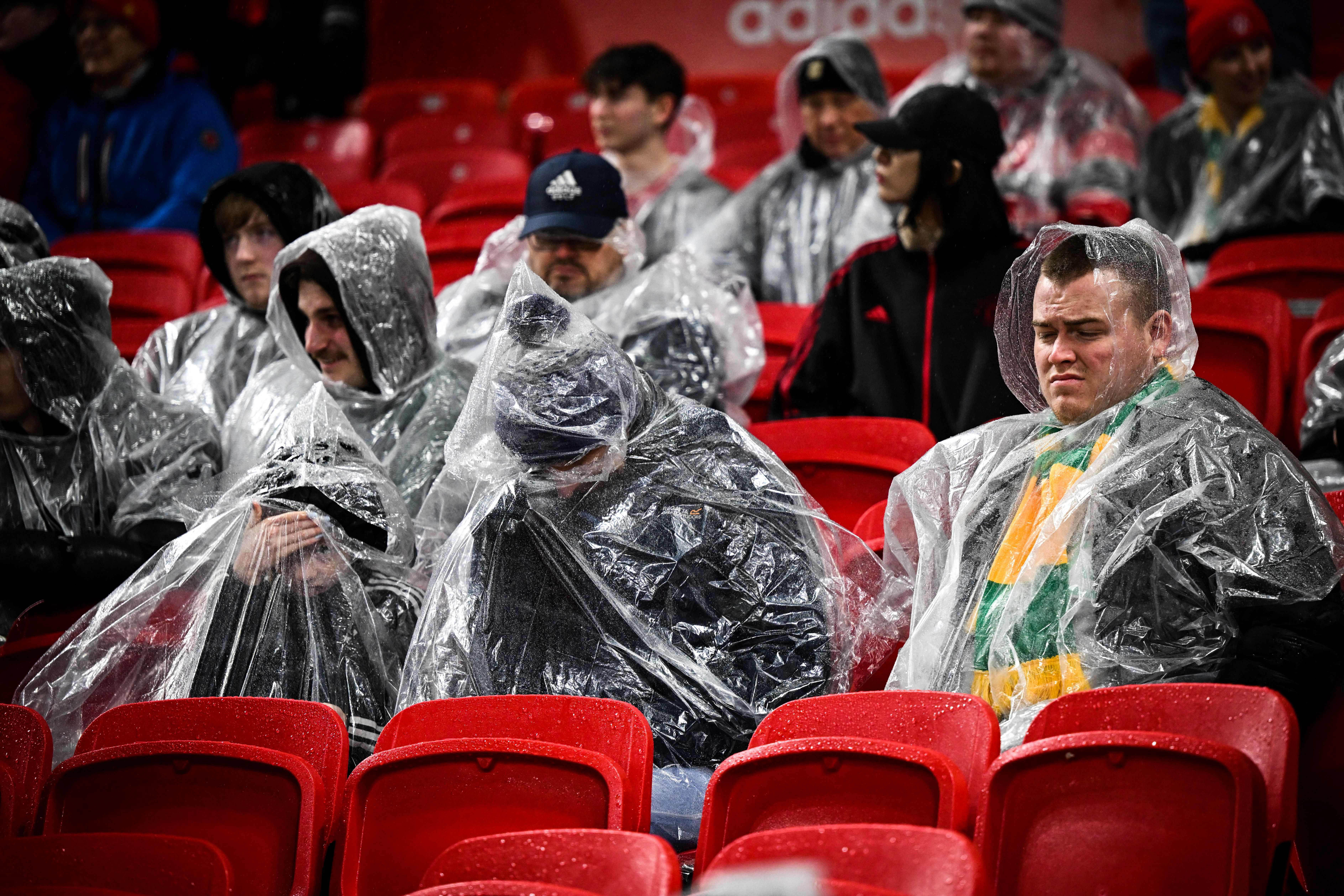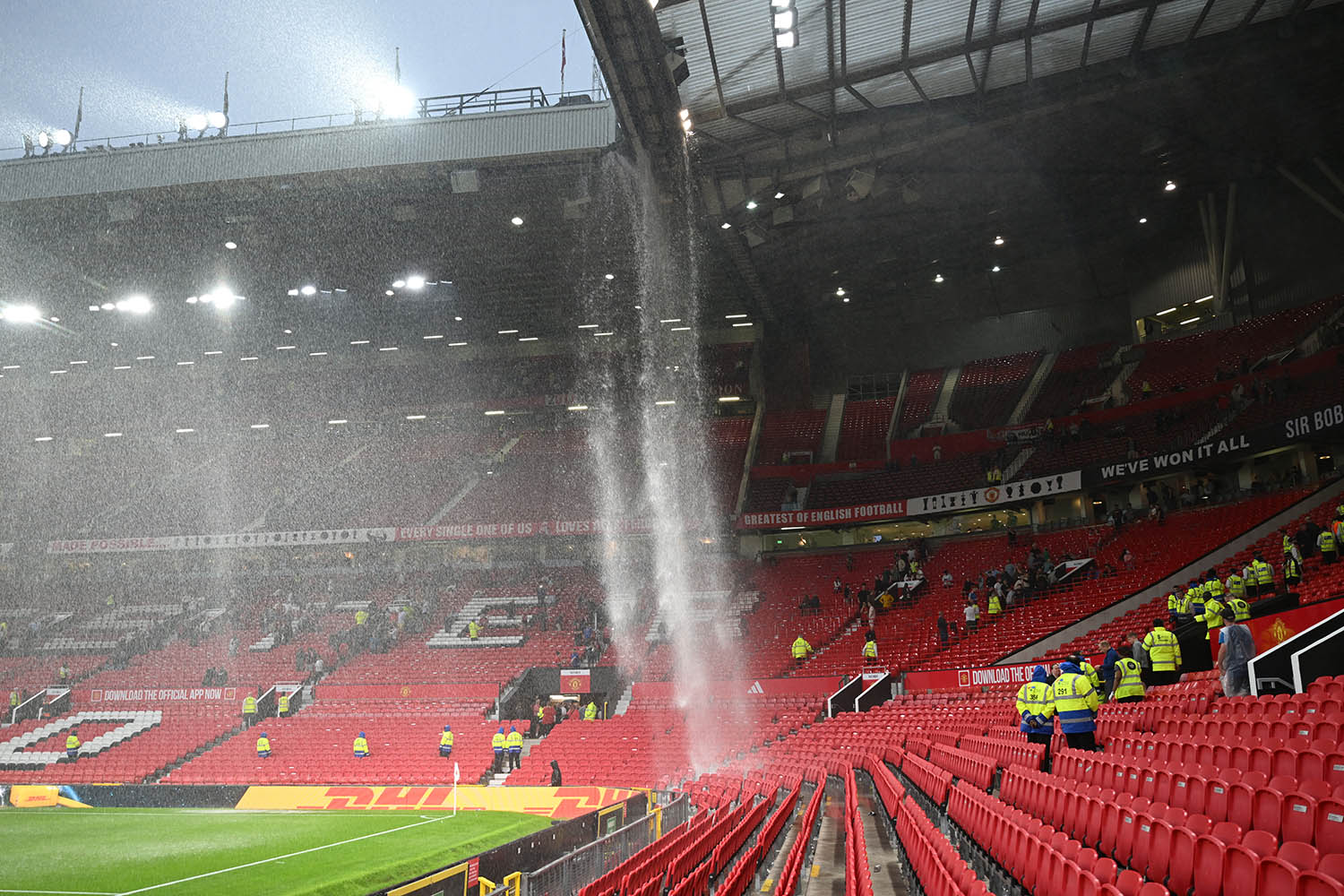To be a Manchester United fan in the age of the Glazers is to step into an LS Lowry painting. It is to be a small, faceless figure on a slow lope towards a game, wanting to move but fixed in place by the brush strokes.
Protests haven’t worked, nor the burning of effigies and death threats. The club went on sale once, but it wasn’t sold. There have been 7,000 tomorrows with little to show for it, and this next one is a landmark: 20 years since the Glazer family took control of Manchester United.
Players and managers have come and gone. The smell of flares has periodically stung the air. The lettering on the Bobby Charlton Stand has turned from bright red to a faded pink. A team who were once all-conquering champions have become a laughing stock. But the canvas is largely unchanged: the Glazers show no sign of selling.
It was wearing rings encrusted with diamonds that the Glazers introduced themselves to most of the United board. These had been earned in victory across the water. The family had won the Super Bowl with the Tampa Bay Buccaneers, an NFL team they had bought in 1995. The meeting came 10 years later, when the Glazers were trying to persuade the United board to let them expand their sporting empire. The rings were as if to say: “We know what success looks like.”
The Glazers started out with a tiny stake. In March 2003, they bought less than three per cent of Manchester United for £9 million. A source who was on the board at the time has told The Observer they didn’t think these new investors were all that important.
But the American family, led by the patriarch Malcolm Glazer, grew their holding. By February 2004, they had a 16.31 per cent share in the club. Speculation mounted that a takeover bid was imminent. Still no one took much heed. Why would they? All eyes were on a horse.
It was over the champion stallion, Rock of Gibraltar, that United’s then manager Sir Alex Ferguson had fallen out with two major shareholders: the racing magnates John Magnier and his business partner JP McManus, who together owned 25.49 per cent of United.
Ferguson, who had been registered as part-owner of Rock of Gibraltar, wanted a share of lucrative breeding rights after the horse retired in 2003. When he was given the cold shoulder, he began legal proceedings.
Magnier and McManus asked corporate detectives to investigate him. In January 2004, a letter was sent to the chairman, Sir Roy Gardner, asking 99 questions about the club’s finances and transfer activity.
Ferguson’s son, Jason, was implicated through his football agency, which represented more than a dozen United players.
Newsletters
Choose the newsletters you want to receive
View more
For information about how The Observer protects your data, read our Privacy Policy
The prevailing fear was that Magnier and McManus would force out Ferguson, who by that time had taken United to eight league titles and a Champions League win.
Shortly after the letter, the billionaires raised the stake held by their investment firm to nearly 29 per cent, just shy of the 30 per cent at which they would have to launch a formal takeover. Their tanks were firmly on the lawn.
What was not seriously considered was McManus and Magnier calling it quits. A source close to the pair has told The Observer McManus had said they would never sell their shares.
But they did and with a final twist: Malcolm Glazer was the buyer. On 12 May 2005, he became the majority shareholder of one of the biggest and most successful football clubs in the world. A few days later he took it private.

The Glazer family paid for United in a fashion more often seen in corporate finance than football, by securing high-interest loans from New York hedge funds against the club’s assets.
A source close to the deal called it the most successful leveraged buyout they had ever seen. What it meant, in practice, was that the club went from having virtually zero debt to nearly £550 million overnight. It will provide scant comfort for United fans to know that such a takeover could not happen today. In 2023, the Premier League voted to cap these buyouts at 65 per cent of a club’s value.
From day one, fans were apoplectic. The Glazer family was smuggled out of their first game at Old Trafford in a police van. A few supporters even formed a breakaway club, FC United of Manchester.
But Manchester United, for a while, continued to thrive. Mark Rawlinson, a top lawyer who advised the club on the takeover, said that despite all their faults the Glazers were shrewd businessmen.
“They foresaw the explosion in broadcasting revenues over the next 10 to 20 years that actually made it a really good investment.”
Commercial revenues quadrupled in the first decade of the Glazers. United won more titles and another Champions League.
What’s evident is that Alex Ferguson was deferring the pain. His former assistant, René Meulensteen, thinks the Glazers took the manager’s preternatural success for granted. “They didn’t care for the club,” Meulensteen said. “They just cared for the brand.”
After Ferguson retired in 2013, the club became a tragicomedy with a rotating cast. The contours of the post-Fergie era could fill an entire sport section, but the shorthand is as follows. In his final 12 years in charge, Manchester United won seven Premier League titles. In the 12 years since, they have had 10 different managers and won none.
This year, United have plumbed new depths. The club have never amassed fewer points in a Premier League season. Manager Ruben Amorim has called his own team perhaps “the worst” in the club’s 147-year history.
Manchester United could still qualify for the Champions League. They are in the Europa League final in 10 days and stand a good chance against Tottenham Hotspur. Just don’t expect Amorim to see the sunny side. He says United would be the “worst Premier League team to win a European trophy”.
Poor performance on the pitch has fed into the club’s money troubles off it. European bonuses forgone; players bought for a premium and sold on the cheap; expensive payoffs for managers and backroom staff. Each is a drag on Manchester United’s bottom line. They have not turned a profit in six years, and when you include hundreds of millions of pounds owed in outstanding transfer fees, their total debt pile exceeds £1 billion.
United’s outlay over the past 20 years includes £166 million in dividends, which have mainly gone to the Glazer family. The Athletic calculated that when you take away these payments, the net amount put into the club under the Glazers is just £45 million.
There was, briefly, some hope. When the billionaire Sir Jim Ratcliffe took a 27.7 per cent share in the club in February 2024, the optimistic faithful wondered if the local boy could put United on terra firma. But Ratcliffe’s role as head of sporting operations belies the extent of his dominion. The Glazers still have voting power and control over the board.
The moves that have been attributed to Ratcliffe have also been widely criticised by the fanbase, whether it is the redundancies of hundreds of backroom staff, a hike in matchday prices, or the bold pronouncement that without such cost-cutting the club would have gone bust by Christmas.
United fans might have accepted this last claim with more grace if it hadn’t been followed a day later by the announcement of a new £2 billion stadium, which was quickly, and not unfairly, compared to a circus tent. The club haven’t said how the stadium will be funded, but land sales around Old Trafford and selling naming rights to the new ground are likely to be a part of it.
Malcolm Glazer died in 2014 at the age of 85. The Tampa Bay Buccaneers remembered him as a “pioneering thinker”, not a turn of phrase repeated by any British obituarists. He said just 27 words about Manchester United in public. Two of them were the word “franchise”.
His children own Manchester United now. At least one of them, Joel, is a devoted fan. He is said to have a picture of the late George Best hanging in his office. A legend of a bygone era, who can offer only faint whispers for the club of today. Maybe Joel should consider a Lowry.
Photographs Michael Regan/Getty Images, AFP/Getty Images



